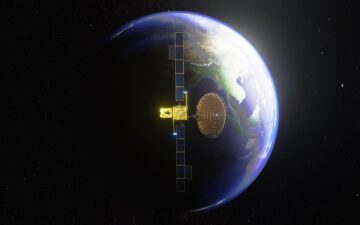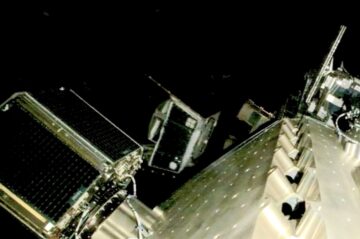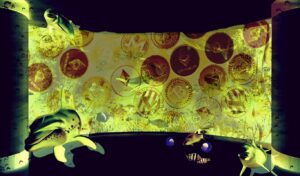
WASHINGTON — A Soyuz capsule landed in Kazakhstan Sept. 27, returning two Russians and one American from the International Space Station after more than a year in orbit.
The Soyuz MS-23 spacecraft landed in its designated landing zone in Kazakhstan at 7:17 a.m. Eastern. The spacecraft had undocked from the station’s Prichal module at 3:54 a.m. Eastern.
On board the Soyuz were Roscosmos cosmonauts Sergey Prokopyev and Dmitri Petelin and NASA astronaut Frank Rubio. They launched to the station last September on the Soyuz MS-22 spacecraft for what was originally planned to be a typical six-month stay.
Those plans changed, though, when the Soyuz MS-22 spacecraft suffered a coolant leak in December. NASA and Roscosmos decided weeks later to not use that spacecraft to bring back the crew, launching an uncrewed Soyuz MS-23 in February to take its place. The crew who were to fly to the station on Soyuz MS-23 in March — Oleg Kononenko, Nikolai Chub and Loral O’Hara — were bumped to Soyuz MS-24, which launched to the station Sept. 15.
NASA and Roscosmos extended the stay of Prokopyev, Petelin and Rubio by six months. The three spent 371 days in space, the third-longest spaceflight after the 438 days spent by Valeri Polyakov in 1994 and 1995 and 380 days spent by Sergei Avdeyev in 1998 and 1999, both on the Mir space station.
The three set the record for longest stay on the ISS. Rubio also set the record for longest single spaceflight by an American, breaking the mark of 355 days set by Mark Vande Hei in 2021 and 2022.
In a call with reporters from the ISS Sept. 19, Rubio admitted he would not have signed up for a year in space if offered in advance. “If they had asked me up front, before you start training,” he said, “I probably would have declined, and that’s only because of family.”
However, he said that once he started training, he was committed to the mission regardless of its length. “Ultimately, that’s our job, and we have to get the mission done.”
He said the hardest point in the mission was when his mission was extended by six months. “That decision really took a couple of months,” he said, as NASA and Roscosmos evaluated the options, giving him and his family the ability to prepare for that extension. “Although it was difficult, honestly I had already come to terms with it.”
The extended mission, he noted, offered valuable experience for future long-duration missions, such as eventual missions to Mars. “The psychological factor was more of a factor than I had expected, but again, just having a really good team around you is such an incredible help,” he said, including finding the right balance between work and relaxation.
Rubio said he looked forward to reuniting with his wife and children, as well as some peace and quiet. “We’re blessed enough to have a quiet backyard, and I think just going out in the yard and enjoying the trees and the silence,” he said, a contrast to the “constant hum” of the machinery on the station. “I’m looking forward to being outside and enjoying the peace and quiet.”
- SEO Powered Content & PR Distribution. Get Amplified Today.
- PlatoData.Network Vertical Generative Ai. Empower Yourself. Access Here.
- PlatoAiStream. Web3 Intelligence. Knowledge Amplified. Access Here.
- PlatoESG. Carbon, CleanTech, Energy, Environment, Solar, Waste Management. Access Here.
- PlatoHealth. Biotech and Clinical Trials Intelligence. Access Here.
- Source: https://spacenews.com/soyuz-returns-iss-crew-after-record-setting-stay/
- :is
- :not
- $UP
- 17
- 19
- 1994
- 1995
- 1998
- 1999
- 2021
- 2022
- 27
- 438
- 54
- 7
- a
- ability
- admitted
- advance
- After
- again
- already
- also
- American
- an
- and
- around
- AS
- asked
- astronaut
- At
- back
- Balance
- BE
- because
- before
- being
- between
- blessed
- board
- both
- Breaking
- bring
- but
- by
- call
- changed
- Children
- come
- committed
- contrast
- Couple
- Days
- decided
- decision
- designated
- difficult
- done
- eastern
- enough
- evaluated
- eventual
- expected
- experience
- extension
- factor
- family
- February
- finding
- For
- Forward
- frank
- from
- front
- future
- get
- Giving
- going
- good
- had
- Have
- having
- he
- help
- him
- his
- Honestly
- HTTPS
- i
- if
- in
- Including
- incredible
- International
- international space station
- ISS
- IT
- ITS
- Job
- jpg
- just
- Kazakhstan
- landing
- Last
- later
- launched
- leak
- Length
- looked
- looking
- machinery
- March
- mark
- mars
- me
- Mir
- Mission
- missions
- module
- months
- more
- Nasa
- noted
- of
- offered
- on
- once
- ONE
- only
- Options
- Orbit
- originally
- our
- out
- outside
- peace
- planned
- plans
- plato
- Plato Data Intelligence
- PlatoData
- Point
- Prepare
- probably
- really
- record
- Regardless
- relaxation
- returning
- returns
- right
- Russians
- Said
- sept
- September
- set
- signed
- Silence
- single
- SIX
- Six months
- some
- Space
- space station
- spacecraft
- spaceflight
- spent
- start
- started
- station
- stay
- such
- Take
- team
- terms
- than
- that
- The
- they
- Think
- though?
- three
- to
- took
- Training
- Trees
- two
- typical
- use
- Valuable
- was
- we
- Weeks
- WELL
- were
- What
- when
- WHO
- wife
- with
- Work
- would
- year
- you
- zephyrnet






